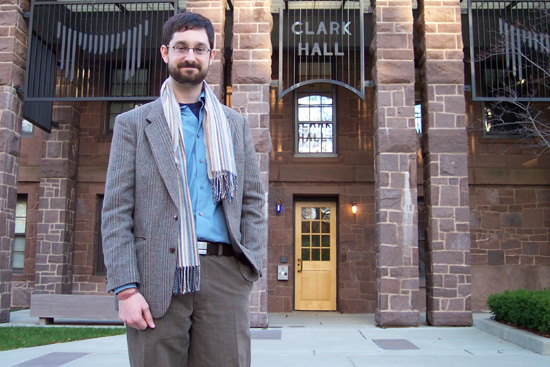Uprooting Racism through Education, Discussion
 |
| Brandon Buehring, area coordinator for Residential Life, helped develop a campus-wide anti-racism discussion board. He also works with the student residents of West College, Clark Hall and Fauver Apartments. |
| Posted 11/16/05 |
| Growing up in southern Texas, Brandon Buehring was taught by his elders, teachers and textbooks that he was living in a post-Civil-Rights-movement racial utopia. Meanwhile, all of his Mexican-American classmates, whose family trees stretched down at least three centuries in to Americas soil, were struggling with the states educational system and government. They were treated, he explains, like invaders.
At the time, Buehring chose to believe that these families werent trying hard enough to do better for themselves. But that all changed when every-day activists friends, professors, authors, supervisors and even strangers – encouraged him to open his heart and think critically about his own identity and the countrys institutions. As an area coordinator for the Office of Residential Life, Buehring wants to also help members of the Wesleyan community tap into their capacity for empathy while challenging their assumptions about race and systems of power and oppression. With the help of his colleagues he has developed an online vehicle titled Uprooting Racism, to help people process the ideas and theories they are hearing in classes and at campus events, and then work together to bring actions to those ideas. The Wesleyan community can join the discussions and check out the projects Web resources by logging in to Wesleyans Blackboard Learning Systems at www.wesleyan.edu/reslife/uprootingracism.htm and type Uprooting Racism in the search box. I believe that racism is tightly woven into the fabric of this country and that it is still very much working to destroy the lives of people of color here and abroad, Buehring says. This is not a belief that people in this country like to consider. It was certainly a belief that I refused to consider for most of my life. The online discussion Buehring has created seeks to engage members of the Wesleyan community in a critical examination of their racial identities and their positions within an intricate system of racial power and oppression in the United States. The process began when an Uprooting Racism planning committee convened in July. Soon after, potential staff and student collaborators were contacted in late August and early September to get feedback on the project and help to generate interest and support. In late September, a steering committee was formed. They meet about once a month. The Uprooting Racism Steering Committee consists of Buehring, Rich DeCapua, Dawn Brown, Eric Heng, Maureen Isleib, Robin Hershkowitz, Sharise Brown, Frances Koerting from the Office of Residential Life; Leilani Kupo and Nicole Chabot from Student Activities and Leadership Development; Dianna Dozier from the Office of Affirmative Action; Lucy Diaz from Academic Affairs; Marina Melendez of Graduate Student Services and residential advisors Iris Jacob 06, Lashawn Springer 08, and Celia Reddick 06. The project will very much be a work-in-progress for the rest of the academic year and one of the steering committee’s main responsibilities will be continually assessing in which ways the project needs to grow to more closely meet our goals, Buehring says. Committee member Melendez admires her colleagues involvement. Brandon is a good person to work with, and has a compassion and clear understanding of what his role is, Melendez says. He understands that he must fight racism by opening dialogue for all people. He is not just a bystander. He is a real activist.” Overseeing the Uprooting Racism project is just one part of Buehrings busy day. As an area coordinator, he works with the residents of West College, Clark Hall and Fauver Apartments. He spends his days meetings with colleagues, students and project committees, and during the evening, he gathers with his 18 residential advisors and student residents. Being an area coordinator really means connecting students with campus resources and helping build enjoyable, respectful, engaged and accountable residential communities, he says. We work hard to infuse our communities with the idea that education is an everyday, life-long process that requires self-accountability, respectful conduct and critical optimism. Buehring holds a bachelors of art in cinema and studio art from Southern Methodist University in Dallas, Texas, and a masters of education in counseling from North Carolina State University. He came to Wesleyan in 2003. I felt that my own values matched up with Wesleyans educational and community values, he says. I had also faced a lot of homophobia and persecution in all previous communities and was looking for a home and working environment that would be much more welcoming. Buehring, of Middletown, enjoys practicing Buddhism, crafting, knitting and reading non-fiction books about politics and education. |
| By Olivia Drake, The Wesleyan Connection editor |

